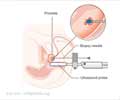New research demonstrates how prostate cancer may metastasize with high dietary fat.
Highlights
- A typical high-fat diet may promote prostate cancer progression.
- The tumor suppressor gene PTEN or PML or in combination have shown to play an important role in containing the spread of prostate cancer.
"The progression of cancer to the metastatic stage represents a pivotal event that influences patient outcomes and the therapeutic options available to patients," said senior author Pandolfi. "Our data provide a strong genetic foundation for the mechanisms underlying metastatic progression, and we also demonstrated how environmental factors could boost these mechanisms to promote progression from primary to advanced metastatic cancer."
The tumor suppressor gene PTEN is known to play a major role in prostate cancer; its partial loss occurs in up to 70 percent of primary prostate tumors. Its complete loss is linked to metastatic prostate disease, but animal studies suggest the loss of PTEN alone is not enough to trigger progression. Pandolfi and colleagues sought to identify an additional tumor-suppressing gene or pathway that may work in concert with PTEN to drive metastasis.
Another tumor suppressor gene, called PML, tended to be present in localized (non-metastatic) prostate tumors, but was absent in about a third of metastatic prostate tumors. Moreover, about 20 percent of metastatic prostate tumors lack both PML and PTEN.
When they compared the two types of tumor - the localized ones were lacking only the PTEN gene versus the metastatic tumors lacking both genes - the researchers found that the metastatic tumors produced huge amounts of lipids or fats. In tumors that lacked both PTEN and PML tumor-suppressing genes, the cells' fat-production machinery was running amok.
Such a drug already exists. Discovered in 2009, a molecule named "fatostatin" is currently being investigated for the treatment of obesity. Pandolfi and colleagues tested the molecule in lab mice. "The obesity drug blocked the lipogenesis fantastically, and the tumors regressed and didn't metastasize."
"I asked, 'What do our mice eat?'" Pandolfi recalled. It turned out; the mice ate a vegetable-based chow - essentially a low-fat vegan diet that bore little resemblance to that of the average American male. When increased levels of saturated fats - the kind found in cheeseburgers and fries, were added in the experimental diet, the mice developed aggressive, metastatic tumors.
The findings could result in more accurate and predictive mouse models for metastatic prostate cancer, which in turn could accelerate the discovery of better therapies for the disease.
Physicians could soon be able to screen their early-stage prostate cancer patients for those whose tumors lack both PTEN and PML tumor-suppressing genes, putting them at increased risk for progressing to metastatic disease. These patients may be helped by starving these tumors of fat either with the fat-blocking drug or through diet.
"The data are tremendously actionable, and they surely will convince you to change your lifestyle," Pandolfi said.
References
- Pandolfi, Chen, Katia Sampier, John G Clohessy,et.al.An aberrant SREBP-dependent lipogenic program promotes metastatic prostate cancer , Nature genetics (2018).DOI:10.1038/s41588-017-0027-2
- Ming Chen, Lixin Wan, Jiangwen Zhang, et.al . Deregulated PP1£\ phosphatase activity towards MAPK activation is antagonized by a tumor suppressive failsafe mechanism, Nature communications (2018).DOI:10.1038/s41467-017-02272-y
Source-Eurekalert
















